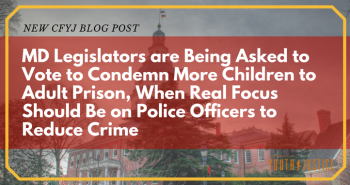MD Legislators are Being Asked to Vote to Condemn More Children to Adult Prison, When Real Focus Should Be on Police Officers to Reduce Crime

By Brian Evans, State Campaigns Director
Right now the Maryland General Assembly is considering draconian, reactionary, “tough on crime” legislation that reads as if it were dictated to them by Attorney General Jeff Sessions himself. The bills (HB100-102, SB197-199) contain all the failed criminal justice policies of the 1980s and 1990s – mandatory minimums, consecutive sentences to ensure longer prison terms, automatically charging children as adults, and absurdly vague language about “gangs.”
Certainly the state – or at least a few neighborhoods in the city of Baltimore – has a significant crime problem, but it has been clearly proven by decades of experience that filling up prisons does nothing but increase recidivism, waste money, and decimate communities. This is why groups from the progressive ACLU to the conservative ALEC oppose returning to the mass incarceration mindset.
Strangely, this push for the harsh punishment of Maryland citizens is occurring at exactly the same time as Baltimore’s police corruption is being exposed on a daily basis.
The ongoing trials of members of the Baltimore Police Department’s elite Gun Trace Task Forcehave revealed a pattern of corrupt practices and criminal activity that ought to be the main subject of discussion for anyone serious about criminal justice reform in Maryland.
Instead legislators are being asked to vote to condemn more children to adult prison.
The proposed legislation, among other things, seeks to automatically send children to adult court if they are charged with “a criminal gang offense”, broadly defining a “criminal gang” as a group or association of three or more persons whose members “constitute an ongoing entity” that has as a primary objective or activity the commission of crimes, and has “an overt or covert organizational or command structure.”
Under this definition, Baltimore’s Gun Trace Task Force, whose members are known to have sold drugs, planted evidence, and robbed people (including at least one home invasion), certainly would seem to qualify as a “gang”. But we know that “tough on crime” never means getting “tough” with police misconduct.
The bills Maryland legislators are now considering will not improve Baltimore’s crime rates, and they do not address the Baltimore Police Department’s serious problems. They are a distraction. They will do nothing but scapegoat young people who more often than not have been that department’s victims. What the Maryland General Assembly is considering now is fear-mongering political fodder that will demonize young people of color while distracting from real reforms that are needed.

